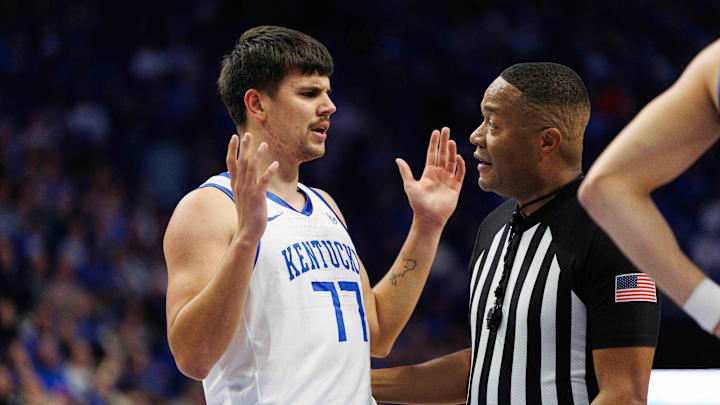College basketball referees face grueling schedules that push their physical and mental limits. Let's be honest it’s impacting games, including those involving Kentucky basketball.
The best referees can officiate up to 80 games in a season, often traveling thousands of miles in short periods. An example would be Roger Ayers who recently worked 31 consecutive days, traveling over 26,000 miles across 15 different states. This relentless pace raises questions about performance under those types of conditions.
Watching the game right now cause I was stuck at work
— dunc 🌎 (@SpartyWRLD) January 16, 2023
The missed hook and hold on Zach Edey against Mady Sissoko has to be one of the worst missed calls I have ever seen. I am appalled.
Fix College Basketball officiating. pic.twitter.com/qXdu4926Ro
Studies from the NIH (National Institute of Health) show that sleep deprivation significantly reduces reaction times and decision-making accuracy. For referees, this could mean missed calls or even worse, inconsistent officiating; factors that can heavily influence tight games.
This is your brain on sleep deprivation.
— Dan Go (@FitFounder) August 5, 2023
Scientists in Canada launched the largest study on how lack of sleep affects the brain.
They created games that tested skills like reasoning, language comprehension & decision making.
They had one participant repeat these tests in an… pic.twitter.com/ulC5tMDZx3
One such NIH study showed that sleep-deprived individuals are at least 11% less accurate and up to 30% slower in high-pressure decision-making scenarios. Considering referees are on the road up to 90% of the time, it’s likely they aren’t performing at their peak. That means they are at least missing 10 percent of calls if they didn't sleep well. In a close game, those little calls often sway wins to losses for men and women in high stakes games:
Sad way for that great game to end. Feel bad for @BaylorWBB. Especially the seniors.
— Kash Shaikh (@Kash_Shaikh) March 30, 2021
That was 100% a foul. pic.twitter.com/YnHPfFbDzS
This refs name is Orlando (forgot his last name)
— Grant Peters (@Real_GP) March 16, 2024
But I was right here the whole game and saw he didn’t make a call all night in Kentucky’s favor
Just went back and watched the tape
He blew his whistle 22 times last night
All 22 were in A&M’s favor
Whether that be a foul on… https://t.co/OsnkC5OzSr pic.twitter.com/5g0JH8OcLw
I don't care what happens the rest of the way, the upset of the NCAA tournament is that they let Brent Hampton back in SLC to referee a game two years after missing this. pic.twitter.com/AwWj7rQClk
— Nick Brilowski (@NickBrilowski) March 21, 2019
Kansas up 90-89 with 15 seconds left and this 100% clean block was called a foul 🥴 #MarchMadness pic.twitter.com/mZ0Uah1LDc
— Bad Sports Refs (@BadSportsRefs) March 22, 2024
NCAA referees undergo rigorous training to maintain high standards, including fitness tests and rules assessments. There are off season symposiums and seminars showcasing what should and should not be done. However, the lack of a consistent schedule and adequate recovery time can compromise even the most seasoned officials. Why do that do it then? Like most of us, money.
Referees are compensated well, according to a source from Mitch Gilfillan, refs are earning $3,500 to $4,000 per game, with some reportedly making $100,000 a month if they can handle the demands. Yet, the toll on their bodies and minds may not be sustainable long-term. And it may cost teams games in the short-term.
SOURCE: The best college refs in America can earn anywhere from $3,500 to $4,000 per game. Ayers is one of them.
— Mitch Gilfillan (@mitchgilfillan) December 6, 2024
“You can make $100,000 in a month if you can handle the travel.”
- Former Division I High Major referee who asked to remain anonymous. https://t.co/5QTn1hHxpG
For Kentucky, this issue has come into focus during the loss to Clemson. Questionable calls or non-calls can shift momentum, as seen in the second half when Kentucky was making runs to close the gap.
Clemson fouls:
— Kyle Eden (@dragonlord741) December 4, 2024
First 10 minutes - 8
Next 30 - 7
Yeah, they changed their tactics and were simply less aggressive, right? Not physical at all those last 30 minutes... pic.twitter.com/K1YjwrnlT4
If you watched the game, you saw how physical Clemson played; they committed only 15 called fouls to Kentucky's 20. They did not even reach the double bonus in either half. That simply is not feasible given the game. Head coach Mark Pope has remained vocal about the importance of not allowing referees decide games, saying he wants his players to feel in control regardless. But at some point, it has to be brought up.
The basketball under Mark Pope is refreshing but so are the press conferences.
— Tyler Thompson (@MrsTylerKSR) November 5, 2024
Last night, Pope talked about how attending a referee symposium changed his perspective on officiating and how proud he is of his guys for using their frontal cortexes and not their limbic systems. 🤯… pic.twitter.com/ke1HQNjNZI
The best possible solution? Advocates suggest reducing game loads for referees and mandating rest periods. Drawing parallels from other industries, such as aviation, where pilots have strict regulations on duty hours, might provide a blueprint. Investing in more full-time referees could also alleviate some of the pressure on travelling refs.
For now, Kentucky fans and players alike must navigate the unpredictable nature of college basketball officiating along with everyone else. Addressing referee fatigue could lead to fairer outcomes and a better experience for all involved.
